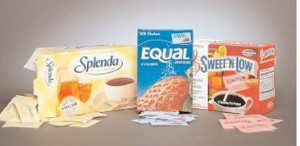By Teresa Sievers, MD, MSMS, FAARM
 Dear Dr. Sievers,
Dear Dr. Sievers,
My 13-year old daughter has been trying to lose weight. In doing so she has been drinking a lot of diet soda and eating a lot of foods with artificial sweeteners. But I’ve been hearing from some of my friends that artificial sweeteners do not help with weight loss. Is that true?
Thank you. Darlene
Dear Darlene,
There is growing evidence that the body responds to sugar substitutes similarly to the way it responds to sugar, causing weight gain, which can lead to diabetes and other diseases. But I would be even more concerned about the harm artificial sweeteners can do to the body. Studies are mounting on the serious side effects caused from these sugar substitutes.
Childhood obesity rates and diabetes are on the rise. In fact, one out of every three children is either overweight or obese. In response, food companies have had to rethink their marketing strategy, offering many of their popular packaged goods as “sugar-free,” replacing sugar with aspartame (NutraSweet® and Equal®) and sucralose (Splenda®). But parents need to be aware of the severe health conditions these popular sugar substitutes pose, especially on children, as their GI tracts are healthier; they absorb more than an adult’s.
Aspartame
The main ingredient in NutraSweet and Equal is aspartame, which is often found in yogurts, sodas and juices. Aspartame is a neurotransmitter present in normal amounts in the brain and spinal cord. When there are high concentrations of these neurotransmitters, they become toxins, specifically excitotoxins, which over stimulates brain activity. Normally our bodies control the amounts of neurotransmittors that surround nerve cells. This requires energy, but eventually the body runs out of energy and the firing of the nerve cells gets out of control until they have no energy.
When nerve cells have no energy, they die. Literally the brain cells are stimulated ‘to death.” This has adverse ramifications for the development of a child’s brain cells, as well as brain function which can affect both adults and children.
But there’s more bad news. Recent studies in Europe have show aspartame use can result in an accumulation of formaldehyde in the brain, which can harm the central nervous system and immune system, and cause genetic damage. Other studies link aspartame to brain damage in children and effect development of the nervous system during early childhood, causing learning and emotional difficulties. But the effects may not be seen until later in a child’s development and can present as a learning disorder such as attention deficit disorder, dyslexia or other emotional problems.
Sucralose
Believe it or not, British scientists stumbled upon sucralose–the main ingredient in Splenda–when they were looking for a new pesticide. While this synthetic sweetener does contain small amounts of natural sugar (sucrose), sucralose is its base. And three other components of sucrose have been replaced with chlorine molecules. The problem with chlorine atoms is they look like iodine, a needed nutrient for the body, especially the thyroid. And because the chlorine atom looks like iodine, the body mistakes it for iodine causing thyroid function and other hormone regulation in the body to be adversely affected. The reality is that chemically speaking, Splenda has more in common with DDT– a banned pesticide in the US– than it does with sucrose.
There are no long-term studies of the side effects of Splenda in humans, but the manufacturer’s short-term studies showed that very high doses of sucralose caused shrunken thymus glands, enlarged livers, and kidney disorders in rodents. But the FDA found this data was not conclusive because the testing was done on rodents. Yet rats were chosen for testing specifically because they metabolize sucralose more like humans than any other animal. Self-reported adverse reactions to Splenda or sucralose include a range of adverse effects including rashes and symptoms related to gastrointestinal and nervous system.
So why are these products on the market? Artificial sweeteners are considered ‘food additives’ which do not have the same rigorous FDA testing that goes into pharmaceutical drugs. Instead, these items are put into the class by the FDA as “generally regarded as safe” (GRAS).
Sugar a better choice
The best choice for your daughter is real organic sugar in small amounts (not high fructose corn syrup.) But she can also take care of her sweet tooth with natural sugars found in fruits. Also keep in mind that sugar cravings are linked to lack of sleep and eating foods that have a high glycemic index (i.e., white flours). So be sure your daughter gets plenty of rest and limits high glycemic foods. And eating plenty of fresh veggies and fruits can also reduce any sugar cravings.
Your daughter could also benefit from one-on-one coaching with Coach Karen. In fact, Coach Karen developed an essential vitamin specifically for children. As you may recall from our previous article on supplements, supporting the body with supplements is needed, even with the healthiest diet. And supplements are especially important in aiding weight loss, not to mention that nutrient deficiencies can cause sugar cravings.
Teresa A. Sievers, MD
Restorative Health & Healing Center
10201 Arcos Av., Suite 201, Estero
Learn more about Dr. Sievers at:
www.rhhcenter.com
Karen R. Callan, CHC, AADP
Certified Health Coach
10201 Arcos Ave., Suite 201 Estero
239-405-9169
Learn More About BEST BODY NOW at:
www.lovemybestbodynow.com









